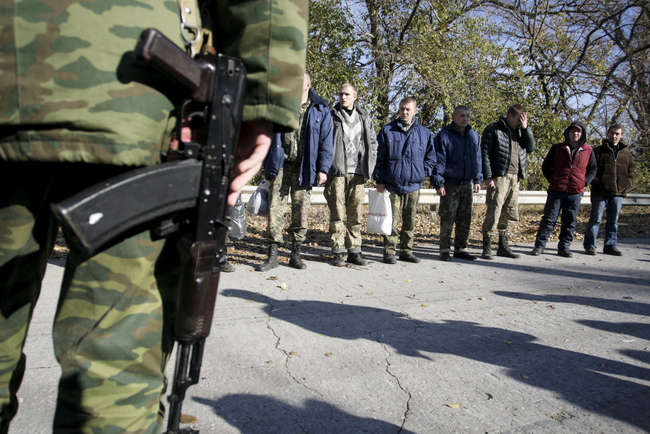“Those who survived the hell”
Reports on Russia’s military crimes in Donbas presented to the European Parliament
Last Tuesday Ukrainian and European human rights advocates in cooperation with the Ukrainian mission to the EU and MEPs submitted three reports on Russia’s military crimes to the European Parliament in Brussels. This information was gathered from original sources and interviews with eyewitnesses. The victims of Russian aggression, former prisoners of Russians, helped present the evidence.
Liudmyla KOZLOVSKA, co-organizer and president of the Open Dialog Foundation, shared more details concerning this event. “At the first panel we submitted the report ‘Those Who Survived the Hell,’ presented by Oleksandr Pavlichenko, member of the Kharkiv Human Rights Advocacy,” shares Kozlovska. “At the second panel we submitted the report ‘Russian War Crimes in the East of Ukraine,’ aimed at prosecuting those who tortured Ukrainian citizens in the east of Ukraine. Among the victims is the former captive Iryna Dovhan and pastor Oleksandr Khomchenko, who testified about what had happened to them, who was responsible for it, and how they were released. Their stories deeply moved the MEPs and the audience in general. This event attracted a lot of attention and interest.
“The third panel saw the report by a Polish MP, PAUCI Foundation, and two former Polish police officers, who had conducted an investigation and interviewed the hostages in Donbas, as well as our report, drawn jointly with the Center for Civic Liberties and Association Euromaidan SOS, titled ‘The Kremlin’s 28 Hostages,’” continues Kozlovska. “As Europe knows mostly only about Nadia Savchenko and Oleh Sentsov, our task was to inform about Ukrainian hostages in Russia and explain why Russia uses them for its military propaganda ends. We made an arrangement with the MEPs, who would take care of each hostage, make inquiries, and organize missions to maximally relieve their conditions, provide the guaranteed health care, and ultimately, release them. Now we are waiting for new information and the extension of the hearing.”
According to Kozlovska, the broad coalition of NGOs, volunteers, and politicians considers the implementation of sanctions related to the so-called Savchenko list. But the list must include Russia’s President Putin in the first place, as well as the politicians who called for (or were implied in) Savchenko’s captivity, like Vladimir Zhirinovsky. All in all, the list contains 49 names, agreed with the Russian opposition, at the Free Russia Forum in Vilnius.
“However, the policy of the Ukrainian government is destructive. It is shared by neither MEPs nor diplomats, as it proposes adding the names of Russian prosecutors and judges to the sanctions list. These people hardly have property or money in Europe, and they need not travel to Europe. Meanwhile, our sanctions list, which is supposed to be a preventive measure, might help release the imprisoned Ukrainians,” adds Kozlovska. At the same time, these are not the only things that anger human rights advocates and Europeans. “We are asked why Ukrainian society is tolerant to what is happening in Ukrainian courtrooms, prosecutor’s offices, and about the progress of the reforms. No one is going to do this for Ukrainians, therefore they must demand that the courts and prosecutors’ offices begin to work. Simultaneously, we explain that Ukrainian civic society is fighting for these goals, but it needs Europe to support it and put concrete demands to Poroshenko and Yatseniuk, who are glib speakers making empty promises.”
Summarizing the Brussels conference, Kozlovska said that an important step for making the aggressor accountable had been taken. “All participants remarked that it was the first step to gather information and evidence, so that the people guilty of persecution and torture could be called to accountability via the International Criminal Court. It is a long way to go, but in fact we will be supported by the European Parliament. Further, we need to address European countries’ national parliaments, which need to pass their own resolutions and back our demands. Now, thanks to our partners from the Center for Civic Liberties, we are trying to involve lawyers who took part in the most recent trials in The Hague. They need to take up cases about Ukraine and Russia. Also, it is a clear signal to Putin’s entourage: you are the next.”
Newspaper output №:
№24, (2016)Section
Topic of the Day





